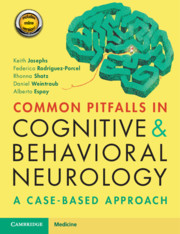Book contents
- Common Pitfalls in Cognitive and Behavioral Neurology
- Common Pitfalls in Cognitive and Behavioral Neurology
- Copyright page
- Dedication
- Contents
- Diseases Discussed in the Book
- Preface
- Acknowledgements
- Abbreviations
- Part 1 Missing the Diagnosis Altogether
- Part 2 Misidentifying the Impaired Cognitive Domain
- Part 3 Missing Important Clues in the History
- Case 11 The Stroke of Clarity
- Case 12 Losing One’s Mind without Knowing?
- Case 13 The Disease Has Caught Up with Her
- Case 14 Recognizing the Right Signs of Memory Impairment
- Case 15 Talking about Family Matters
- Part 4 Failure of Pattern Recognition
- Part 5 Difficult-to-Characterize Cognitive/Behavioral Disorders
- Part 6 Clinical Findings That Are Subtle
- Part 7 Misinterpreting Test Results
- Part 8 Attributing Findings to a Known or Suspected Disorder
- Part 9 Missing Radiographic Clues
- Part 10 Management Misadventures
- Index
- Plate Section (PDF Only)
- References
Case 14 - Recognizing the Right Signs of Memory Impairment
from Part 3 - Missing Important Clues in the History
Published online by Cambridge University Press: 03 November 2020
- Common Pitfalls in Cognitive and Behavioral Neurology
- Common Pitfalls in Cognitive and Behavioral Neurology
- Copyright page
- Dedication
- Contents
- Diseases Discussed in the Book
- Preface
- Acknowledgements
- Abbreviations
- Part 1 Missing the Diagnosis Altogether
- Part 2 Misidentifying the Impaired Cognitive Domain
- Part 3 Missing Important Clues in the History
- Case 11 The Stroke of Clarity
- Case 12 Losing One’s Mind without Knowing?
- Case 13 The Disease Has Caught Up with Her
- Case 14 Recognizing the Right Signs of Memory Impairment
- Case 15 Talking about Family Matters
- Part 4 Failure of Pattern Recognition
- Part 5 Difficult-to-Characterize Cognitive/Behavioral Disorders
- Part 6 Clinical Findings That Are Subtle
- Part 7 Misinterpreting Test Results
- Part 8 Attributing Findings to a Known or Suspected Disorder
- Part 9 Missing Radiographic Clues
- Part 10 Management Misadventures
- Index
- Plate Section (PDF Only)
- References
Summary
This 67-year-old right-handed woman presented with a 3-year history of memory problems. Her husband reported that she first had difficulty recognizing people, including close family members, such as grandchildren. He also reported she struggled to understand the meaning of words. As an example, she did not cook from recipes anymore, as she could not recognize the ingredients by their names. She had become repetitive and forgetful of recent conversations. However, she was still able to do her own finances, manage medications, and take care of most household chores. A year before her evaluation, her Montreal Cognitive Assessment (MoCA) score was 20/30 due to impairments in clock drawing, naming, phonemic fluency, abstraction, and delayed recall (she did not recall any words freely and recognized four when multiple choices were given). Neuropsychological evaluation revealed predominant language impairment, and brain MRI showed bilateral temporal atrophy (see Figure 14.1). Her presentation was interpreted as early-onset Alzheimer disease, and she was started on donepezil and, later, memantine.
- Type
- Chapter
- Information
- Common Pitfalls in Cognitive and Behavioral NeurologyA Case-Based Approach, pp. 42 - 44Publisher: Cambridge University PressPrint publication year: 2020



